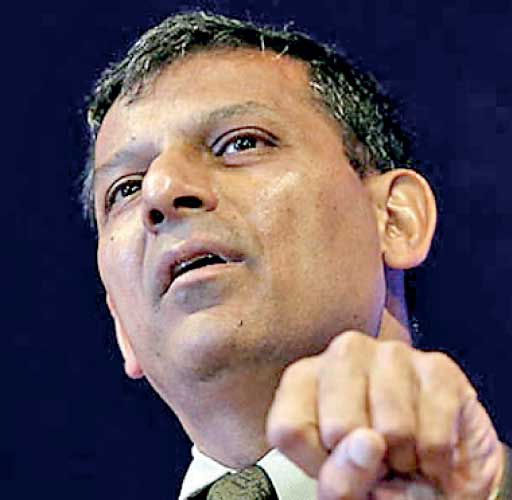Thursday Feb 19, 2026
Thursday Feb 19, 2026
Thursday, 21 May 2015 00:00 - - {{hitsCtrl.values.hits}}

Raghuram Rajan
The ‘spectre of deflation’ is spurring the world’s major central banks into a dangerous struggle for stronger domestic growth that imperils financial markets and ignores the needs of developing nations, Reserve Bank of India Governor Raghuram Rajan said on Tuesday.
Rajan, making a familiar argument for better global coordination on monetary policy, said central bankers in developed economies should take more seriously their international responsibilities.
He called for better leadership from the International Monetary Fund. The Fund, Rajan said, should examine each unconventional monetary policy that is proposed or in place around the world and decide whether it meets the greater good of the global economy.
“The current non-system in international monetary policy is, in my view, a source of substantial risk, both to sustainable growth as well as to the financial sector,” Rajan told an audience of economists and investors in New York.
“I fear that in a world with weak aggregate demand, we may be engaged in a risky competition for a greater share of it,” he added. “We are thereby also creating financial sector risks for when unconventional policies end.”
The US Federal Reserve, the European Central Bank and the Bank of Japan have purchased more than $ 10 trillion in bonds to fight deflation and help kick-start growth in their respective economies following the global recession.
The mass monetary easing had sent a rush of funds into developing economies like India, sending currencies and stocks to records. More recently, the end of the Fed’s bond-buying and the prospect of a US interest rate hike has had the opposite effect, stoking volatility in financial markets.
Rajan, a former IMF chief economist, said that since “the spectre of deflation haunts central bankers,” it is no wonder that developed countries do not want to settle for low growth “even if that is indeed their economy’s potential.”
Still they should not ignore their responsibilities to developing economies, he said, adding the IMF should be the arbiter of whether accommodative policies are ‘in- or out-of-bounds’.
The “IMF is perfectly capable of doing these things. But it needs leadership. Because the central banks won’t do it themselves, (the IMF) needs the political leadership,” Rajan said after a speech to the Economic Club of New York.
“We have the organisation. It needs people to recognise that we are moving from crisis to crisis.” American, European and Japanese central bankers often acknowledge the volatile effects their policies have on the rest of the world. But they argue that even developing economies benefit from their stronger domestic economies.
IMF Managing Director Christine Lagarde has applauded the aggressive monetary easing by major central banks and has warned against a premature tightening in the United States.